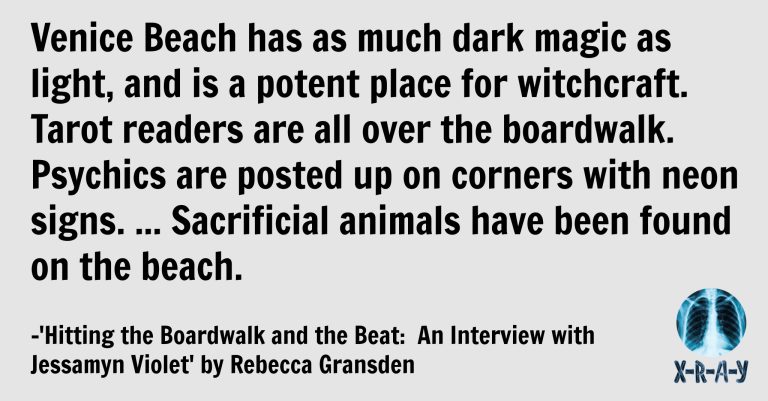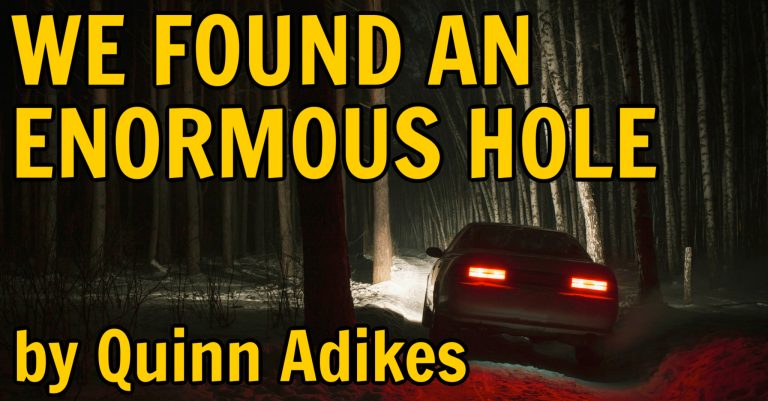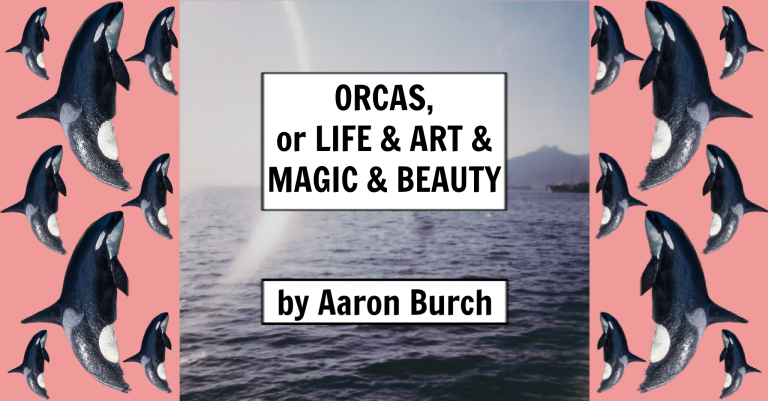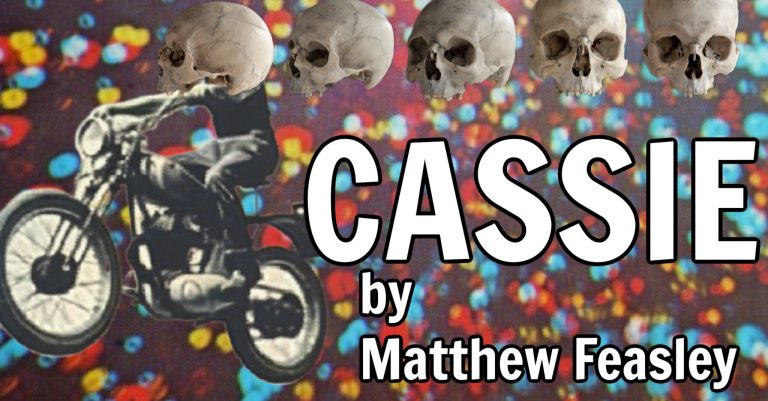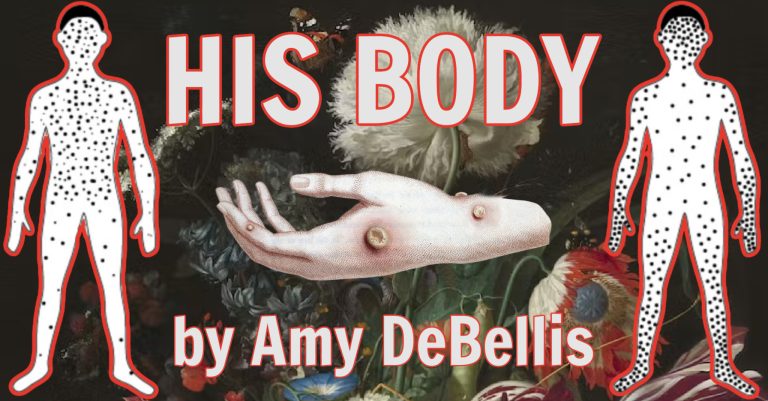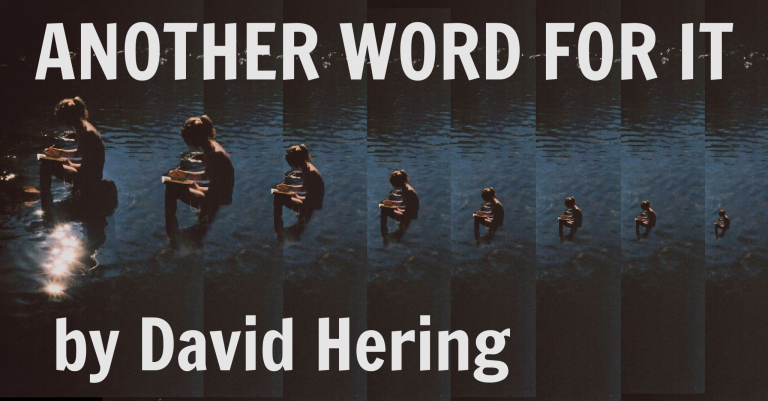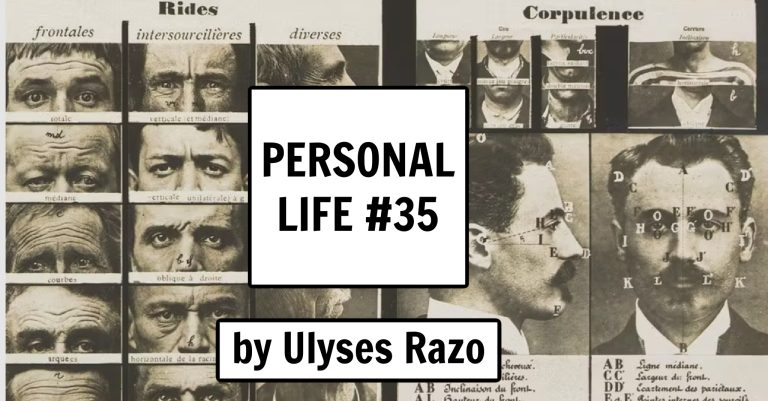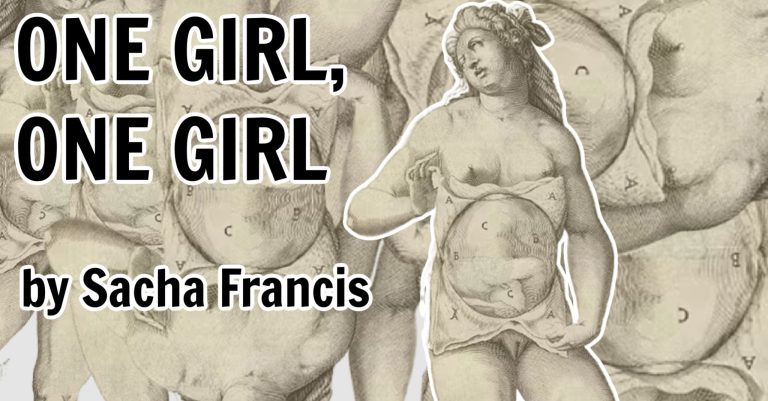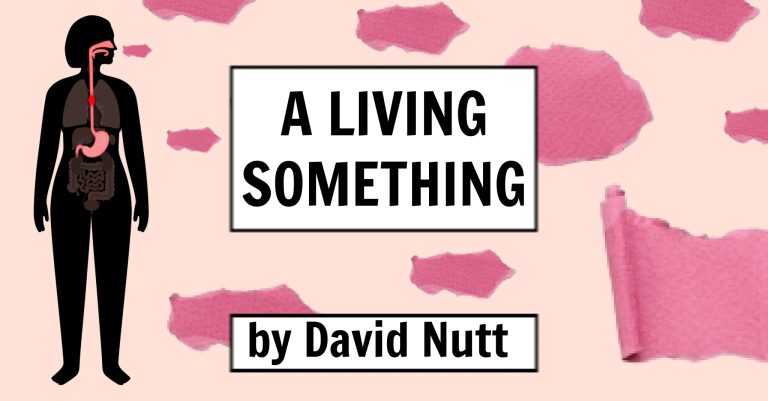
A LIVING SOMETHING by David Nutt
My wife looms at the ledge of the bed. The cold meat of my brain, freezer-burned with slumber, is still in defrost mode. Meanwhile, my wife has already risen, showered, powdered, dressed, breakfasted, read the morning news, cried about the morning news, genuflected and regurgitated, and undressed again. Now she stands naked in the middle of the room, like an unflappable art-class model, waiting for her indolent husband to get up and do something meaningful, and maybe felonious, with his life. I can’t fake it anymore. I get up and go to the closet, where we keep the new suit piled atop the canoe cushions we used at four months, the pillows we passed off as five.I try to chirp the theme music from some public-television programming—the kind of children’s show that takes place in a psychotropically colorful wonderland populated by ragged hand-puppets and a smattering of adult actors, always in supporting roles, who teach sensible, low-impact morality lessons while struggling to beat back the melancholy tide of time. I whistle three trilling notes. My wife interrupts me with a dejected sigh of her own and reaches ceilingward. “Just strap the fucking thing on,” she says.I glide the foam mold over her upper body, negotiating its blunt juts and bony angles, her knuckled spine, the curled shrimp of her ribcage. She resembles a famished insect sliding into its shell. Sure, she could do it herself, but it’s the collaboration she needs. A co-conspirator. Someone to share the secret and blame, and maybe, too, some kind of vestigial love. I double-knot the flesh-colored straps and tuck the washing-instructions tag inside the hollow bowl of her armpit. “How do I look?” she asks, draping a floral-print maternity shroud atop the big belly. The shroud is sized extra-large to create a bit of ambiguity about the duration.“Like six months,” I say, a little too hesitantly.My wife fixes herself in the mirror and turns smoothly, like a showroom automobile on a rotating stage, something too glossy to believe, let alone buy. Her face empties. The lower lip starts to jiggle. “I look like I’m nine months,” she says. “I’m ready to rupture.” Me, I am doing my usual hangdog grovel, the one look in my repertoire I do not have to falsify or embellish. “They only had the one size in stock. You still appear ravishing to poor cretins like me.”She takes my loose face in her hands and lifts it, me, to the light. Semi-sweetly, she says, “Who are you fucking kidding?”“There is literally a shell of ice around my brain. If you give me a few minutes to thaw—”“We are so hopeless,” she says.I lie: “I don’t think that at all.”She releases me but holds to her reflection, glaring hard at the boyish hips, the vitamin-deficient skinny and pall. “You’re going to be late for work.”“I’m not going to work.”“You’re still going to be late,” she says.
Read More » ***
That first slothful winter: I sat in my car, the heat low, the radio off, depriving myself of the commuter life’s few amenities—in lieu of legitimate penance, I suppose—while the car sat in one undistinguished parking lot after another. I wasn’t looking very diligently. I just stared at the slabs of opaque frost my breath left on the windshield. How spectacular, the things the body did when nobody was paying attention, when nobody cared. Instead of music or talk radio, I listened to the clamor of my shivering organs and somatic departments, tabulating the chattiest offenders. Curdled fluids, tired fibers, damaged loins. All my spooky nooks were gossiping about me. I etched my initials in the frosted glass, X’d them out, then wrote different initials. When I returned home at the end of the day, my wife was on the couch, beta-testing a new breed of pout, one that combined compassionate disappointment with compassionate disgust.“What happened?” she asked. “Huh?”“You’re limping.” “My leg got crampy from sitting all day in the car.”“You were in the car? How can you get one when you’re sitting in the car?”The television was muted, flickering in the dark. I tried to flutter my eyelids to synchronize with the strobe. All any of us want, I guess, is an allegiance with something. Even something inane.“It’s like an arctic expedition out there,” I said, peeling off my itchy mittens and wool scarf and false beard. “They’re bundled up and getting pushed in strollers, or they’re leashed up and dragging their parents across the frozen tundra. I’m not fast enough to chase sled dogs. I can’t loaf around the stores like those do-gooders from the Salvation Army.”Her pout solidified, aged, fossilized. I could count the gloomy pocks and cragged ridges now imprinted across her frozen tundra. So many ancient, incredulous creases.“The office called,” she said.“What did you tell them?”“I told them there were complications. I said the doctor sent us to the hospital, and the hospital was sending us to a specialist.”“That’s smart.”“I feel like we’re the stupidest people alive.”“That, too,” I said.I left my goulashes in a puddle of muck by the door, and I joined my wife on the couch. She was watching her wildlife program again. This episode featured a pride of lions gorging on a buffet of eviscerated zebra carcasses. Black-white-red stripes striated the screen like an experimental test pattern. Our clandestine panics and emergencies seemed to be articulated so purely in the wobble. The most unnerving part was the lack of sound. All that ferocious churning, the lazy and thoughtless carnage, zero repentance, not a single groan or complaint or scream of thanks. I turned to my wife and tried to find her face in the dithering half-light. Her lips were stained brownish, as if she had been feasting on chocolate mousse. Better than the wallpaper. She was balancing a mug of hot cocoa on the stuffed koala that was bulging out of her sweatpants—the second of her stomachs. The hand towels kept slipping out.I laid a hand in her lap.“Please don’t touch me,” she said.I nodded. “Because of the complications. We’re going to see the specialist. We are living the role. Just like those TV lions with their talent agents and SAG cards and publicists.”“You should ice that leg.”“I’ve had enough ice for one day. Can I get you anything?”“Yes,” she said. “Please get off the couch.” “What else?”“Go out.”“Where?”“Try another parking lot. Maybe an elementary school or playground or pediatrician’s office. If you stay here, we’ll never get pregnant.”***
Springtime delivers its own silver platter of ripe disappointments. I spend my mornings loitering on a half-acre of grim, sun-scalded blacktop outside one of five Discount Utopias in the tri-county region. I avoid the popular supermarkets because their parking lots are populated by squads of embittered teenagers in dirty khakis and too-large smocks who tend the shopping-cart corrals and pretend to look competent. Discount Utopia has no such extravagance. The clientele is a mix of whiskered retirees living on fixed incomes and young unwed women who cannot possibly bear the thankless burden of motherhood alone. Best of all, management is too miserly to refurbish the outdoor sodium lamps or install security cameras. This rankles me as a citizen and potential customer, but as a needy, skulky father-to-be, I am content to exploit the lapse.I never venture into actual stores. Sadly, I no longer have the disposable income to make superficial purchases that justify my public sharking. My wife and I live off the dividends of her dead parents’ stock portfolio, which is not as robust as it used to be. I can barely afford to put gas in the car that I can barely afford to lease or insure. I’ve been on alleged paternity leave at work so long, I don’t think I have a job anymore. I also don’t think I have the chutzpah to call up my company’s HR hotline and ask if I can have my old position back, or maybe get a different position, or at least pay the office a perfunctory visit and box up my things. It’s midday. I’m hunched at my car’s front left tire, pretending to fix a flat. Occasionally I stand up and sulk around, scratching at the cheap nylon wig that hugs my head. Nobody stops for me. Nobody offers any help. Certainly no Good Samaritans with small, fledgling Samaritans in tow.After a while, I notice a bagboy with an unflattering flattop and a face of pusillanimous acne, lingering at the corner of the building. He’s sneaking a cigarette on his lunch break. I imagine this violates some stodgy corporate protocol, but I am probably not the best person to lodge a complaint with his shift supervisor. Maybe this makes us allies of a sort? Maybe not. The young guy coolly observes my helplessness charade, his lank fame leaned against the brick wall like a bracket too loosely screwed, his sloughy potato face leaking smoke. The kid’s dawdling makes me nervous, and I decide I better flee. I kick the tire a few times. I shrug like it’s no big deal. But I can’t find the keys to my car. I’ve misplaced them. When I glance up again, the kid has flicked the butt and is wiping the ash off his apron as he strolls over. He wants to give me a few helpful pointers.“That tire isn’t flat.”“Thanks,” I say.“Look at that tread. You’ve barely driven on it.” He has a particular gloat in his voice, but there is something uncertain in his expression, a weird fissure or breach. His eyeballs are skittering in their sockets.“Anything else?” I ask.He scans the expanse of the parking lot, formulating some special notion behind those rootless eyes. He sidles up next to me. “I get it,” he whispers. “Pretending your car is busted and you’re stranded here, so some lusty lady will pick you up, take you home, and serve you a dish of piping-hot poon. It’s a good shtick.”He winks at me.“You’ve got the wrong idea,” I say. “I have a wife.”“That’s cool, man. Did you skeez up on her in a parking lot, too?”The kid flashes a nervous smile. He tries another wink.“Stop winking at me,” I say. “You look diseased.”He slouches against the adjacent car, a station wagon with more rust than paint, and fusses his nametag: Karl. Maybe this is just me, but I find something greatly destabilizing about spelling Karl with a K. He lights another cigarette and tries to smoke in stoic solitude. I can tell the hypotheticals are niggling him.“I met my wonderful heterosexual wife,” I explain, “in one of those comedy improv classes that were all the rage a few years ago. The point had been impressed upon me by several colleagues and supervisors that such a class might help me burnish my social skills, which apparently needed a whole lot of burnishing. I had big dreams of being a normal human being.”“Did it help? The class?”“Of course not. But I met a strange, pretty, shy woman who was just as lonely as me, and just as unfunny, and we started a hopeless, laughless life together.”“My folks met in Al-Anon—” “I’m unspooling a narrative here, Karl-with-a-K.” The seventeen-year-old gives a stiff nod, worldly and resolute, as if bluffing knowledge is the same thing as knowledge itself. Maybe that’s true, and this bagboy career is but a springboard to some loftier trade, like bagel slicer or latte flunky. Either way, he hasn’t traded the agony of adolescence for the agony of adulthood just yet, and those sour teen years bring a wisdom and pain of their own. We’d all do well to heed the lessons of the Karl-with-a-Ks of the republic. They will be the ones, after all, who will usher us into assisted living facilities, ladle out our pills and morphine drips, and launch our ghastly ashes into space.“The narrative?” he says, urging me on.I tell him she wanted a child more than anything, probably more than she wanted a husband. But there was a minor problem. I’d already had the procedure done.I point to my groin.“You got circumscribed?”“Yes,” I say, grinning. “Circumscribed. Exactly.”It had been an extreme course of action, perhaps, but I had been a pitiful bachelor for so long. The loneliness may have deranged me. I wasted most of my twenties and early thirties going to craft fairs, yoga retreats, prochoice rallies, anywhere single women might congregate and need companionship. But they must’ve smelled the desperate pheromones wafting off me, and they stayed away. I thought I’d be alone forever and that’s what I deserved. The vasectomy was a form of revenge against myself. Then I met this sweet woman who suffered a crippling sadness and believed that having children would fix the terrible, broken thing inside her. I didn’t want to disappoint this woman. I didn’t want to lose her. I acted as if everything was fine. Maybe a miracle would stumble along and save me. It had happened already, my meeting her. Maybe it could happen again.The kid rubs his haircut, so short and unforgiving, I can tabulate the dents in his scalp. He also has this weird cauliflowered ear that seems a consequence of some barbaric junior varsity sport.“They can reattach them,” he says.“Huh?”I look down. He’s doing the groin point, the unseemliness of which is now apparent to me.“I wasn’t castrated, Karl. I’m not livestock.”He nods evenly. “Science.”“Anyway I already tried that. There was this dodgy surgeon in a strip mall. I should’ve found someone more reputable, someone with steady hands who wasn’t quivering on gin. This hack was all I could afford. He hacked me up, all right. Now the machinery is totally kaput. I didn’t tell my wife about that, either. What could I say?”I catch him side-eyeing the store entrance. His interest is flagging, but I’m not ready to let him leave. This confession stuff is invigorating. Unfortunately, I can’t speak this way to my wife. Her brittle constitution just couldn’t handle it. Ergo, I need to purge every last ounce of honesty from my system before I get anywhere near hearth and home.“It’s strenuous work, pretending you want a child,” I tell him. “You don’t happen to have any younger siblings or cousins, do you?”The kid chuckles and gives his patchy skull one final rub, then traipses off, back to the store, before I can grab him and wrestle him into the trunk.I locate my car keys, glinting, on the ground. Maybe I have a gaping hole in my pocket, the same size and shape, roughly, of the gaping holes in my head and loins and life. Maybe all of me is one large rupture, too tatty and moist to ever be stitched back together. I grab the ring of keys and—I don’t know why—I pitch them overhand, with mild fury, at a nearby car, not realizing the car isn’t empty. Some haggard guy pops up from the backseat, where he was evidently napping. Is he homeless? Jobless? Familyless? Is he an unfortunate guy or a lucky guy? What are the odds he’s a disgraced genital surgeon looking to redeem himself with a little pro-bono work?I shrug and meekly wave. Then I do my funny, joggy walk of shame to fetch the keys from underneath a battered hatchback. I notice this vehicle is also occupied: an old dowager wielding a pair of scissors, clipping coupons from the local pennysaver. I check another car, and another, and another. Dozens of people are sitting in dozens of vehicles, their postures cramped, their faces vacant, everyone waiting for some miracle or accident or statistical fluke to restore order and comprehension to their day. In the last car, I see a glazy, hunched shape in a rainbow-striped shirt and corduroy dungarees, tiny and alone. I scrunch closer. But it isn’t an abandoned child. It’s a CPR doll that some sadistic prankster has buckled into the backseat. The molded-plastic face looks a thousand years old. The decal eyes gaze back at me, an expression of blank, readymade oblivion—and the awful joy of it.I hustle home.***
My wife is in our bedroom with four years’ worth of funeral wear spread flat on the bed. I’m not sure what she’s trying to tell me, standing there, silently reviewing all that mournful black. I’m in the doorway with a wine-in-a-box that I’ve been ferrying around in the boot of our car for months. Neither my wife nor I drink. Honestly, we don’t do much of anything aside from bicker and grieve the loss of a future that was never ours to claim. Now she’s afraid of leaving the house, and I’m afraid of her fear. I sometimes wonder how it would look on TV, a wife who likes to play dress-up to baffle her biology, confuse her uterus, into fertility, and a husband who lurks the world’s loneliest parking lots, too cowardly to steal children he doesn’t really want. I don’t know if we’re living a harmless sitcom or one of those vulgar true-crime shows.It’s late evening. Despite a fine selection of morbid clothing, my wife is still wearing her cheetah-spotted bathrobe. No preggers suit, no plush belly. She gives me this tolerant yet terrorized look. There’s a great frenzy of eyelash involved. “What’s going on?” I ask. “Nothing.”“Honey? Baby?”“Don’t call me that.”“Tell me,” I say, trying not to stutter the words. “Is this…another miscarriage?”My wife folds her arms and ekes out a low moan. Near the baseboard behind the bed, where she thinks I won’t bother to look, is a strip of pink sirloinish paint that resembles a living organ, a living something, where the wallpaper has been finagled and peeled away. My emaciated wife is secretly stripping the house bare and cramming it down her digestive tract. Then she vomits up the chewed chunks, along with her meals, her sadness, her spite. I have heard that pica is a risk for pregnant women, but their disconsolate impostors, too? Perhaps there is a special degrading flavor in wallpaper that we all long to taste. Here’s another fear: The more our little prenatal ruse gets drawn out, the sicker and weaker my wife grows, so I must prolong the ruse, if only to protect her from reality, making her even sicker, weaker, etc. The destructive urge? I understand that. It’s the cleanup that confounds me. We bury another bedraggled bath towel in the backyard, and we start again.***
This morning belongs to a field trip of senior citizens who are bused in from a retirement enclave outside of town. I watch their leisurely parade across the blacktop with their twinkling wheelchairs and chrome walkers, a coagulated mudslide of tweed, pilled flannel, garish polyester. By lunchtime, the housewives arrive in their shapeless muumuus and defeated sweatpants, and several hours after that, the five o’clock business crowd, i.e., my people, their neckties loosened, shirttails untucked, trailing their usual draft of smothered despair. In between the clusters, I spot several truant teenagers, a few runty, genderless individuals of ambiguous age. No children, though. The daylong sun is cooking me into my vehicle’s upholstery, and in a fit of heat-infused delirium, I fantasize about grabbing one of the old folks, lashing it like a Douglas fir to my rooftop, and speeding home. Maybe I could fasten a pink bow around the senior’s skull and make it shout “Mommy!” as I drag the poor thing kicking and crying through the front door. Then, I don’t know, maybe I reward it with a lollipop or pension or something?Eventually, I get so restless I climb out. I walk around the car. I walk around the lot. I walk all the way into the store. I know I should sidestep the one-way mirrors and hidden cameras and loss-prevention experts masquerading as incognito shoppers, but I’m just too tired for any more subterfuge. Assorted customers amble in the aisles, aloof and distracted, trying to desperately suppress their pitiable dreams long deferred, the cravings and nostalgias and wry hopes that have both buttressed and doomed their lives, and mine. I don’t encounter any abandoned carts or deserted offspring. These people have watched too many news programs. They’ve seen too many horror movies. Right now, their children are safely at home, locked in the basement with electronic monitors clamped on their ankles, GPS chips imbedded behind their golden smiles.Then, as I’m standing in the party-supply aisle, mired in reverie, I’m nearly T-boned by a woman navigating an overloaded cart. She grumbles an apology, and I step out of the way, whereupon I notice, rather helplessly, the child slotted in the cart’s foldout seat. I feign interest in a rack of crepe streamers and bend around to get a better look. What I see mortifies me. The toddler has a face so mean and crumpled—red meaty cheeks, wet chin jutting—so utterly judgmental, I could almost be staring at a picture of myself.I’m already sorry it is happening: I clench up, set my feet, rear back, and I smack the child so hard it tumbles sideward into a bin of holiday tinsel. The shouting is instantaneous. They tackle me from all sides. Customers, shelf stockers, managers, cashiers, custodians, the lone security guard waddling out of the restroom with his pants half-hitched. The entire world descends upon the party aisle—upon me, screaming, too, at the bottom of the heap—and everyone begins pulling me apart, ligament by ligament, broken piece by broken piece, and I feel like finally, finally I must have done something right.
